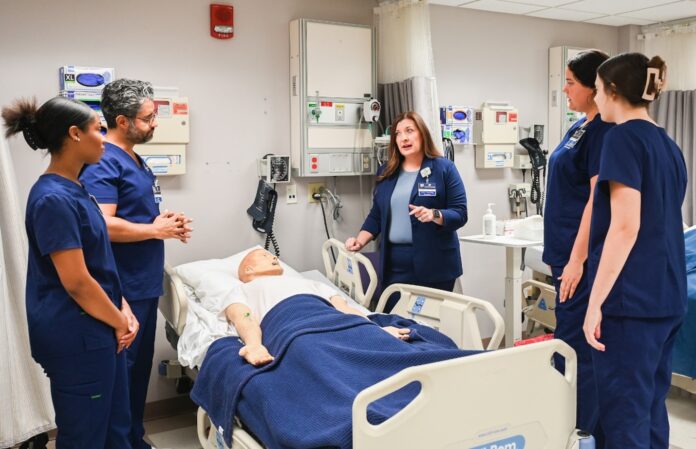
CHATTANOOGA—A $1.4-million grant from the federal Health Resources and Services Administration (HRSA) has been awarded to the University of Tennessee at Chattanooga School of Nursing to prepare undergraduate students to meet the needs of rural and medically underserved populations.
Dr. Brooke Epperson, assistant professor and undergraduate coordinator in the School of Nursing, is the principal investigator—landing a three-year grant through the HRSA Nursing Education, Practice, Quality and Retention (NEPQR) Simulation Education Training (SET) program for the project titled “AHEAD-RN,” an acronym for Addressing Health Equity, Access and Diversity through Nursing simulation experiences and partnerships.
Through AHEAD-RN, UTC and clinical partners will increase the availability and capacity of nurses by concentrating on the health care needs and improving patient outcomes of rural and/or medically underserved populations. They will use innovative academic-practice partnerships to prepare undergraduate nursing students for the workforce through clinical and simulation experiences that combine academic and clinical learning.
Overseen by the U.S. Department of Health and Human Services, HRSA is the primary federal agency for improving access to health care services for people who are uninsured, geographically isolated and economically or medically vulnerable.
Landing the award is especially noteworthy because it is the first grant funding received for the UTC undergraduate BSN program in many years.
“The premise of this grant is to have practice-ready graduates,” said Epperson, a member of the UTC faculty since 2016 and a nurse at Tennova Healthcare Cleveland in Bradley County. “We have new BSN essentials that came out from the (American Association of Colleges of Nursing)—a part of our accrediting body—with a really big focus on end-of-life and palliative care.”
Palliative care is specialized medical care for people with serious illnesses like cancer or heart failure.
“So we were thinking of how can we step up our game from a simulation perspective to be able to meet the needs of our students and to be able to care for individuals with certain behavioral health issues, end of life, palliative, the aging population and homelessness,” she continued.
Epperson, a first-time project director, was applying for her first federal grant. A registered nurse since 2006, she has three degrees from UTC—a BSN in 2010, a Doctor of Nursing Practice in 2020 and a Master of Business Administration in 2021.
The grant will increase training opportunities for BSN students through the use of simulation-based technology, including equipment, to increase their readiness to practice upon graduation.
“I always feel like we graduate practice-ready students, but there are some situations they’re not going to see as often or be a part of in the clinical setting as often,” Epperson said. “Not every student is going to get that experience of being able to see someone transition at the end of life or be in palliative care. What does that mean? Difficult conversations.
“Every student will be exposed to it, and we’re also looking at creating a homeless sim(ulation). So again, providing care in different areas the students aren’t necessarily in regularly and ensuring that everybody has that experience and feels confident in the material.” Epperson said the BSN program typically has around 200 students at any given time, estimating that 350 to 400 students will be impacted during the grant period.
